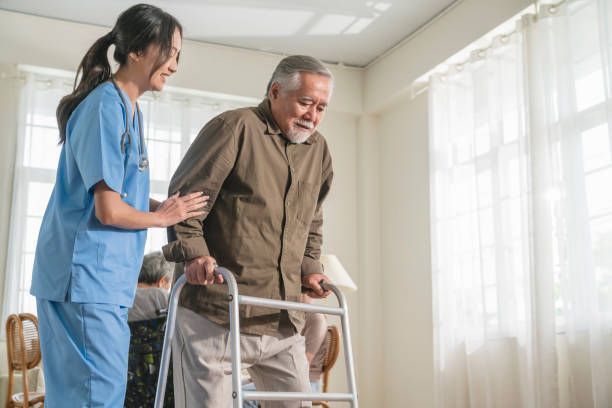Understanding Shingles: Causes, Symptoms, and Care
According to the American Medical Association (AMA) "if you were born before 1990 you might remember spending a week home from school with chickenpox. A sibling may have also stayed home with chickenpox at the same time. That’s because a vaccine wasn’t widely available until 1995. And if you had chickenpox as a kid, that means as an adult you’re at risk of developing shingles, which is a painful condition caused by the reactivation of the virus that causes chickenpox.
"Shingles affects about one out of three people in the U.S. in their lifetime. Additionally, about 1 million people get shingles each year in this country," according to the Centers for Disease Control and Prevention (CDC).

Welcome to 7 Day Home Care, where we prioritize your health and well-being. In this article, we discuss a topic of significant concern, especially for our elderly community: shingles. As we age, our immune systems undergo changes that can leave us more susceptible to certain conditions, and shingles is one such ailment that becomes increasingly prevalent among the elderly. Join us as we explore the causes, symptoms, and potential risks associated with shingles, shedding light on the importance of understanding and addressing this condition in our senior population.
Shingles, also known as herpes zoster, is a viral infection caused by the varicella-zoster virus, the same virus that causes chickenpox. This condition can be painful and disruptive, making it crucial to understand its causes, symptoms, prevention, and care.
What is Shingles?
Shingles, also known as herpes zoster, is a viral infection caused by the varicella-zoster virus, the same virus that causes chickenpox. This condition can be painful and disruptive, making it crucial to understand its causes, symptoms, prevention, and care. Shingles occurs when the varicella-zoster virus, which remains dormant in nerve cells after a person has had chickenpox, reactivates. The result is a painful rash with fluid-filled blisters that typically appear on one side of the body. The reactivation often happens later in life, leading to the manifestation of shingles.
How is Shingles Contracted?
Shingles is not directly contracted from someone with shingles but rather from the varicella-zoster virus. Individuals who have had chickenpox are at risk, as the virus can reactivate due to factors such as age, weakened immune system, or stress. However, the varicella-zoster virus can be spread from a person with active shingles to a person who has never had chickenpox or the chickenpox vaccine. The person exposed to the virus would develop chickenpox, not shingles.
Symptoms of Shingles
The symptoms of shingles can be both distressing and unmistakable. Characterized by a painful rash that often appears as a band or strip on one side of the body, individuals with shingles may experience fluid-filled blisters that can be itchy and, at times, burst, forming open sores. Accompanying the rash are flu-like symptoms such as fever, headache, and fatigue. The intense pain associated with shingles can persist even after the rash has healed, a condition known as postherpetic neuralgia. Recognizing these symptoms early is crucial for prompt medical intervention and effective management of this viral infection.
Prevention Measures
Preventing shingles is paramount, particularly for the elderly who may be more vulnerable to its effects. Vaccination stands out as a key preventive measure, with the shingles vaccine recommended for individuals aged 50 and older. This vaccine significantly reduces the risk and severity of shingles, offering valuable protection against this viral infection. Additionally, maintaining a healthy lifestyle plays a crucial role in bolstering the immune system. Engaging in regular exercise, adopting a balanced diet, and managing stress contribute to overall well-being and can lower the likelihood of shingles. At 7 Day Home Care, we emphasize the importance of these preventive measures to safeguard the health and vitality of our elderly community.
The information provided here about shingles is for general informational purposes only and should not be considered as medical advice. Shingles can vary in its presentation and impact from person to person. It is crucial to consult with a qualified healthcare professional for accurate diagnosis, personalized advice, prevention, vaccine, and appropriate treatment options. While efforts have been made to ensure the accuracy of the information, medical knowledge is subject to change, and new developments may arise. 7 Day Home Care is not responsible for any actions or decisions made based on the information provided, and individuals are encouraged to seek professional medical guidance for their specific health concerns.
Who is at Risk?
The elderly are more prone to shingles due to age-related changes in the immune system. As people age, their immune response weakens, making it more challenging for the body to control the reactivation of the varicella-zoster virus, which causes shingles. Additionally, factors like stress, chronic illnesses, and certain medications can further compromise the immune system, increasing the susceptibility to shingles in older individuals. Vaccination is a recommended preventive measure for those aged 50 and older to reduce the risk and severity of shingles.
Risks Once Contracted
Once contracted, shingles can pose significant risks, particularly for the elderly population. The intense pain associated with the condition can be debilitating, affecting the individual's quality of life. Moreover, elderly individuals are more susceptible to complications, such as postherpetic neuralgia, a persistent nerve pain that can last long after the rash has healed. The risk of skin infections is heightened, as the blisters may become open sores if not properly cared for, leading to potential complications. Given the age-related changes in the immune system, the elderly face an increased likelihood of experiencing more severe symptoms and prolonged recovery. Recognizing and addressing these risks promptly through medical intervention is crucial to ensuring the well-being of our elderly loved ones grappling with shingles.
Medical Remedies
Medical remedies for shingles aim to alleviate symptoms, shorten the duration of the illness, and prevent complications. Antiviral medications, prescribed by healthcare professionals, play a crucial role in managing shingles by reducing the severity of symptoms and speeding up the healing process. Pain management is another key aspect, often involving over-the-counter pain relievers or prescription medications to address the intense discomfort associated with the condition. Additionally, topical treatments such as calamine lotion or wet compresses can be applied to soothe the rash. Seeking prompt medical attention allows for a tailored approach to treatment, ensuring that individuals with shingles receive the necessary medications and care to minimize the impact of this viral infection on their well-being.
The duration of shingles varies from person to person, but on average, the condition typically runs its course over two to four weeks. The initial stage involves the development of a painful rash and fluid-filled blisters, which may take about 7-10 days to reach their peak. As the blisters start to crust over and heal, the intensity of symptoms tends to diminish. However, postherpetic neuralgia, a persistent nerve pain in the affected area, can linger for weeks or even months after the rash has disappeared. Timely medical intervention, including antiviral medications and pain management, can contribute to a faster recovery and reduce the risk of complications, emphasizing the importance of seeking professional healthcare advice when dealing with shingles
Understanding the nuances of shingles is essential, particularly for our elderly community. At 7 Day Home Care, we recognize the impact that shingles can have on the well-being of our loved ones and emphasize the importance of preventive measures, early detection, and timely medical intervention. By staying informed about the causes, symptoms, and risks associated with shingles, we empower individuals and their families to take proactive steps towards health and resilience. If you or a loved one suspect the onset of shingles, we strongly advise seeking the guidance of healthcare professionals for personalized care. Together, we can prioritize the health and comfort of our elderly community, ensuring a supportive and informed approach to dealing with shingles.
7 Day Home Care provides outstanding home health care services in Manhattan, Queens, Nassau County, Brooklyn, and Suffolk County, New York. Call us today at 516-408-0034 or visit 7 Day Home Care to learn more about our affordable home care services in NYC and Long Island, New York.
Brian Callahan
7 Day Home Care


Living With Parkinson’s Disease: How In-Home Care Helps Seniors Stay Safe, Independent & Comfortable








